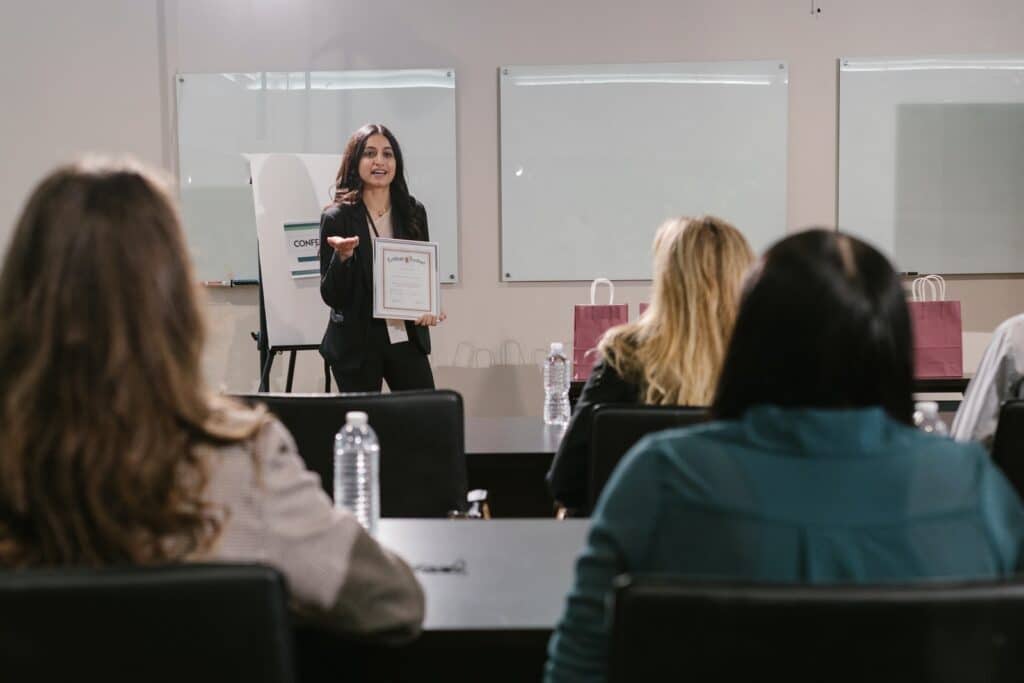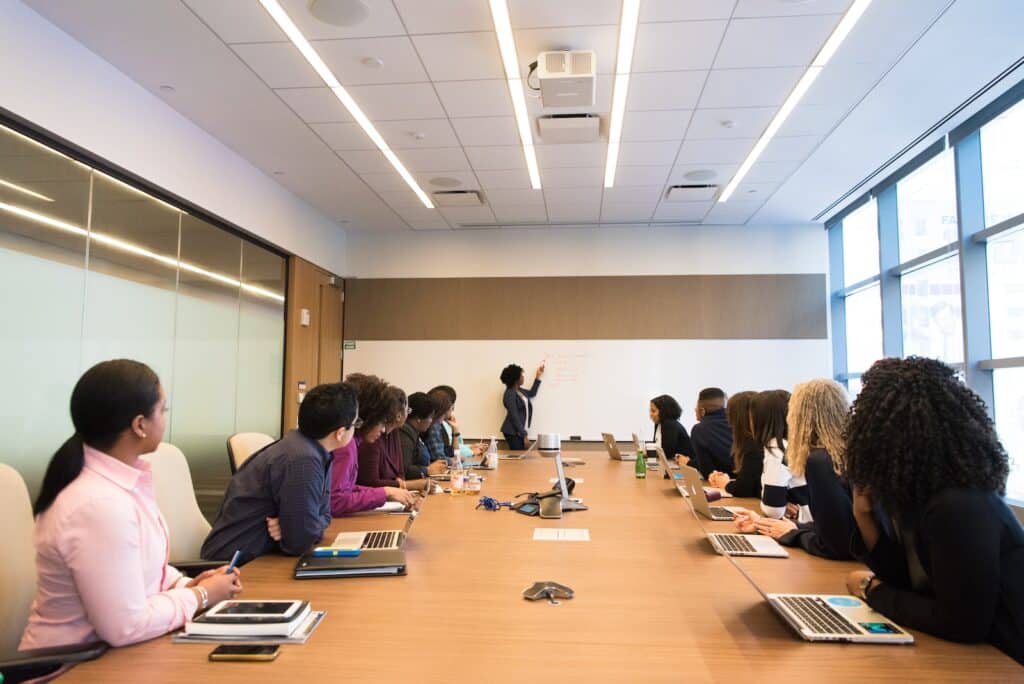If you’re an event planner looking to make a career change, international education may be the field for you. Not only does this field offer various job opportunities worldwide, but it also allows you to use the transferable skills you’ve developed in event planning. In this article, we’ll help you understand the connection between event planning and international education, identify your strengths, show you how to build your network, and enhance your resume for a successful transition.
Understanding the Connection Between Event Planning and International Education
Event planning and international education share many similarities. Both require excellent communication skills, attention to detail, and the ability to multitask. In event planning, you’re responsible for coordinating and executing a successful event that meets your client’s expectations. In international education, you’re responsible for coordinating and executing successful programs and initiatives that meet the needs of students, educators, or professionals. The planning process and execution steps in both fields are similar, making it easier for you to transition from event planning to international education.

Skills that Transfer from Event Planning to International Education
Event planning requires various skills, including project management, communication, budgeting, marketing, and problem-solving. These skills also transfer to international education. Project management skills will help you plan and execute program initiatives effectively. Communication skills will help you work with diverse groups of people from different cultures. Budgeting skills will help you manage program resources wisely. Marketing skills will help you promote your programs to your target audience, and problem-solving skills will help you find solutions to potential issues that may arise.
Project management is an essential skill in both event planning and international education. In event planning, you need to manage the project from start to finish, ensuring that everything runs smoothly. In international education, you need to manage program initiatives, ensuring that they meet the needs of the students or educators you’re working with. Effective project management requires attention to detail, strong organizational skills, and the ability to multitask.
Communication is another critical skill that transfers from event planning to international education. In event planning, you need to communicate effectively with your clients, vendors, and event attendees. In international education, you need to communicate effectively with students, educators, and professionals from different cultures. Effective communication requires active listening, clear and concise messaging, and the ability to adapt your communication style to your audience.
Budgeting is also an important skill in both event planning and international education. In event planning, you need to manage the budget for the event, ensuring that you stay within your client’s budget. In international education, you need to manage program resources, ensuring that you allocate funds effectively. Effective budgeting requires a strong understanding of financial management principles, attention to detail, and the ability to make data-driven decisions.
Marketing is another skill that transfers from event planning to international education. In event planning, you need to market your event to your target audience effectively. In international education, you need to market your programs to students, educators, or professionals effectively. Effective marketing requires a strong understanding of your target audience, the ability to develop compelling messaging, and the ability to leverage various marketing channels.
Problem-solving is also an important skill in both event planning and international education. In event planning, you need to anticipate potential issues and develop contingency plans to address them. In international education, you need to anticipate potential issues that may arise during your program initiatives and develop contingency plans to address them. Effective problem-solving requires the ability to think critically, the ability to remain calm under pressure, and the ability to make quick decisions.
The Importance of Cultural Awareness in Both Fields
Both event planning and international education require cultural awareness. In event planning, you need to understand your client’s cultural preferences, ensuring that you plan and execute an event that meets their expectations. In international education, you need to understand the cultural differences of the students or educators you’re working with, ensuring that you develop programs that are culturally sensitive and inclusive.
Effective cultural awareness requires an understanding of cultural norms, values, and beliefs. It also requires the ability to adapt to different cultural contexts and the ability to communicate effectively with people from different cultures. Developing cultural awareness requires an open mind, a willingness to learn, and the ability to reflect on your own cultural biases.
In conclusion, event planning and international education share many similarities. Both fields require excellent communication skills, attention to detail, and the ability to multitask. The skills required in event planning, including project management, communication, budgeting, marketing, and problem-solving, also transfer to international education. Both fields also require cultural awareness, ensuring that programs and events are culturally sensitive and inclusive. If you’re looking to transition from event planning to international education, the skills you’ve developed in event planning will serve you well in this field.
Identifying Your Strengths and Interests in International Education
Before making a career change, you need to identify your strengths, skills, and interests in international education. Ask yourself what type of roles interest you, what skills you have, and what qualifications you need to pursue these roles. Research job descriptions and to see what qualifications, experience, and skills are required for various roles in international education. This information will help you assess your current skills and adjust them to meet the job requirements where necessary.

When identifying your strengths, consider your communication skills, cultural awareness, and adaptability. These are crucial skills in international education, as you will be working with people from diverse backgrounds and cultures. You should also consider your organizational and problem-solving skills, as these are essential in roles such as study abroad program coordinators and international program directors.
Types of Jobs in International Education
International education offers various roles for event planners interested in working in the field. These include study abroad program coordinators, international student advisors, international program directors, and international education consultants. Each of these roles requires different skills and qualifications, and a career in international education can be highly rewarding.
Study abroad program coordinators are responsible for managing study abroad programs for students. They work with faculty and staff to develop and implement programs, and ensure that students have a positive and safe experience while abroad. International student advisors provide support and guidance to international students, helping them adjust to life in a new country and navigate the challenges of studying abroad. International program directors oversee the development and implementation of international programs and partnerships, and work to promote internationalization at their institution. International education consultants work with organizations and institutions to develop and implement international education programs and initiatives.

Assessing Your Skills and Experience
Assessing your current skills and experience is essential to determine what skills and experience you need to gain to make a successful transition to international education. You can do this by reflecting on your strengths, evaluating your transferable skills gained from event planning, and pursuing relevant qualifications or certificates in international education.
Transferable skills from event planning that are valuable in international education include project management, budgeting, and marketing. These skills can be applied to roles such as study abroad program coordinators and international program directors. Pursuing relevant qualifications or certificates in international education can also help you gain the knowledge and skills needed for a successful career in the field.
Aligning Your Passions with Your Career Goals
Aligning your passions with your career goals is crucial to pursuing a fulfilling career in international education. Reflect on your passions, interests, and values and see how they align with the available job opportunities in international education. Choosing the right career path will ensure job satisfaction, productivity, and longevity in the field.
If you are passionate about promoting cross-cultural understanding and communication, a career as an international student advisor or international education consultant may be a good fit. If you enjoy working with students and helping them have a positive study abroad experience, a role as a study abroad program coordinator may be the right choice. Whatever your passions and interests, there is a role in international education that can provide a rewarding and fulfilling career.
Building Your Network in the International Education Field
Building your network is essential to finding job opportunities in international education. It’s not only about what you know, but also about who you know. By building relationships with professionals in the field, you can gain valuable insights and access to job opportunities that you may not have otherwise known about.
Here are some additional tips on how to build your network in the international education field:
Joining Professional Associations and Organizations
Joining professional associations and organizations is an excellent way to meet industry professionals, stay current with industry standards and practices, and gain access to their job boards and professional development opportunities. These associations and organizations often have local chapters, which can provide additional opportunities for networking and professional development.
For example, the Forum on Education Abroad is a professional association dedicated to promoting high-quality education abroad experiences for students. They offer a variety of resources and opportunities for professionals in the field, including webinars, workshops, and an annual conference.
NAFSA: Association of International Educators is another leading professional association in the field. They offer a variety of resources and opportunities for professionals in the field, including a job board, professional development opportunities, and an annual conference.
EAIE (European Association for International Education) is a professional association for individuals involved in international education in Europe. They offer a variety of resources and opportunities for professionals in the field, including a job board, professional development opportunities, and an annual conference.
Attending Conferences and Networking Events
Attending conferences and networking events is another way of building your network in international education. These events provide an excellent opportunity to meet professionals in the field, learn about current trends and best practices, and showcase your skills and experience.

Some popular international education conferences include the NAFSA Annual Conference, the Forum on Education Abroad Conference, and the European Association for International Education Conference. These conferences typically feature keynote speakers, workshops, and networking opportunities.
Networking events, such as happy hours or meetups, are also a great way to connect with professionals in the field. These events are often more casual and provide an opportunity to make connections in a relaxed setting.
Connecting with International Education Professionals on Social Media
Finally, social media is an excellent tool for connecting with international education professionals worldwide. It’s incredibly easy to connect with like-minded professionals in the field and engage in discussions through platforms like LinkedIn, Twitter, and Facebook groups dedicated to international education.
LinkedIn is a particularly useful platform for building your professional network. You can connect with professionals in the field, join groups related to international education, and share your own insights and experiences.
Twitter is another platform where you can connect with professionals in the field and stay up-to-date on current trends and news in international education. You can follow hashtags like #intled or #studyabroad to find relevant content and connect with other professionals in the field.
Facebook groups dedicated to international education are also a great resource for connecting with professionals in the field. These groups often feature job postings, discussions, and networking opportunities.
By using a combination of these strategies, you can build a strong network of professionals in the international education field. This network can provide valuable insights, job opportunities, and support as you navigate your career in this exciting and dynamic field.
Enhancing Your Resume and Skills for International Education
Enhancing your skills and resume is crucial to making a successful transition to international education. Pursuing relevant certifications and degrees, gaining experience through volunteering or internships, and showcasing your event planning skills in your resume and cover letter are excellent ways of enhancing your skills and standing out from other applicants.
Pursuing Relevant Certifications and Degrees
There are various certificates and degrees in international education that you can pursue to enhance your skills and knowledge in the field. These include certificates in program management, intercultural communication, study abroad advising, and international student services, among others. Pursuing a graduate degree in international education is another way of enhancing your skills and expertise in the field.
Gaining Experience through Volunteering or Internships
Volunteering or interning in international education is an excellent way to gain experience and make connections in the field. You can volunteer at study abroad fairs, assist in international student orientation, or intern at international education organizations to gain practical experience. This experience will set you apart from other applicants and show your dedication to the field.
Showcasing Your Event Planning Skills in Your Resume and Cover Letter
Showcasing your event planning skills in your resume and cover letter is essential to emphasize how your transferable skills can be applied to international education. Highlight your experience in planning and executing successful events, managing budgets, coordinating logistics, and working with diverse groups of people. This information will show potential employers how you can apply your skills to international education and make a successful transition from event planning to international education.
Conclusion
Transitioning from event planning to international education requires careful planning, networking, and enhancing your skills and resume. However, it’s a career change that can be highly rewarding, as international education offers various job opportunities worldwide and allows you to make a positive impact on students, educators, and professionals globally. So, take the time to explore your interests, build your network, enhance your skills and resume, and make a successful transition to a fulfilling career in international education.


